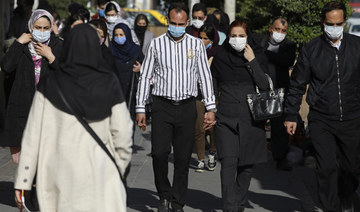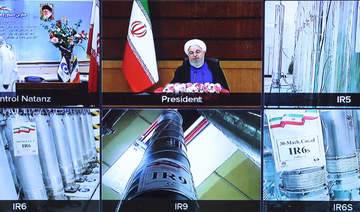AMMAN, Jordan: Iran’s flagship Natanz nuclear research plant was crippled on Sunday by what was claimed to be an Israeli sabotage cyberattack.
The attack took place a day after Iran launched new advanced uranium enrichment centrifuges at the desert site in the central province of Isfahan.
The plant suffered a catastrophic loss of power in what Iran’s nuclear chief Ali Akbar Salehi said was an act of “nuclear terrorism.”
The attack was carried out by “opponents of the country’s industrial and political progress, who aim to prevent development of a thriving nuclear industry,” he said.
Iranian officials said no one had been injured in the attack, and there was no leak of radioactive material.
Israeli media said the Mossad spy agency had carried out the cyberattack, and the damage was more extensive than Iranian authorities had admitted.
The Natanz plant was also hit by a fire in July last year, which Iran said was an attempt to sabotage its nuclear program.
The Stuxnet computer virus, widely believed to have been developed by the US and Israel, was discovered after it was used to attack Natanz in 2010.
Opinion
This section contains relevant reference points, placed in (Opinion field)
Iran has also blamed Israel for last year’s killing of nuclear scientist Mohsen Fakhrizadeh, who Western intelligence services believe was the mastermind of a covert Iranian nuclear weapons program.
The new attack on Natanz comes amid efforts by Tehran and Washington to revive Iran’s 2015 nuclear deal with major powers after Donald Trump abandoned it three years ago and reimposed sanctions.
US Defense Secretary Lloyd Austin visited Israel on Sunday in an attempt to calm Israeli unease over the revival of the deal, the Joint Comprehensive Plan of Action (JCPOA). Israeli officials have long threatened military action against Iran if they believe diplomacy has failed.
Analysts told Arab News the visit was aimed at helping the US return to the JCPOA. “President Joe Biden is worried that Israeli Prime Minister Benjamin Netanyahu would like to escalate the situation in the Gulf, with the aim of torpedoing the eventual return to the Iran nuclear deal,” said Lamis Andoni, an analyst in Amman.
Maamoun Abu Nawwar, a former Jordanian air force general, said: “The fact that the first senior official from the Biden administration to visit Israel is a military man is a clear sign that they are hoping he will address the potential of a dangerous escalation … between Israel and Iran.”
Barak Ravid of the US news website Axios said: “Austin will try to make sure there is a ‘no surprises’ policy when it comes to Iran, and will try to reassure the Israelis about the nuclear talks. The Biden administration wants to make sure tensions in the region do not escalate in a way that sabotages the nuclear talks.”
DUBAI: Iran on Sunday described a blackout at its underground Natanz atomic facility an act of “nuclear terrorism,” raising regional tensions as world powers and Tehran continue to negotiate over its tattered nuclear deal.
While there was no immediate claim of responsibility, suspicion fell immediately on Israel, where its media nearly uniformly reported a devastating cyberattack orchestrated by the country caused the blackout.
If Israel was responsible, it further heightens tensions between the two nations, already engaged in a shadow conflict across the wider Middle East. Israeli Prime Minister Benjamin Netanyahu, who met Sunday with US Defense Secretary Lloyd Austin, has vowed to do everything in his power to stop the nuclear deal.
Details remained few about what happened early Sunday morning at the facility, which initially was described as a blackout caused by the electrical grid feeding its above-ground workshops and underground enrichment halls.
Ali Akbar Salehi, the American-educated head of the Atomic Energy Organization of Iran, who once served as the country’s foreign minister, offered what appeared to be the harshest comments of his long career, which included the assassination of nuclear scientists a decade ago. Iran blames Israel for those killings as well.
He pledged to “seriously improve” his nation’s nuclear technology while working to lift international sanctions.
Salehi’s comments to state TV did not explain what happened at the facility, but his words suggested a serious disruption.
“While condemning this desperate move, the Islamic Republic of Iran emphasizes the need for a confrontation by the international bodies and the (International Atomic Energy Agency) against this nuclear terrorism,” Salehi said.
The IAEA, the United Nations’ body that monitors Tehran’s atomic program, earlier said it was aware of media reports about the incident at Natanz and had spoken with Iranian officials about it. The agency did not elaborate.
However, Natanz has been targeted by sabotage in the past. The Stuxnet computer virus, discovered in 2010 and widely believed to be a joint US-Israeli creation, once disrupted and destroyed Iranian centrifuges at Natanz amid an earlier period of Western fears about Tehran’s program.
Natanz suffered a mysterious explosion at its advanced centrifuge assembly plant in July that authorities later described as sabotage. Iran now is rebuilding that facility deep inside a nearby mountain. Iran also blamed Israel for the November killing of a scientist who began the country’s military nuclear program decades earlier.
Multiple Israeli media outlets reported Sunday that an Israeli cyberattack caused the blackout in Natanz. Public broadcaster Kan said the Mossad was behind the attack. Channel 12 TV cited “experts” as estimating the attack shut down entire sections of the facility.
While the reports offered no sourcing for their information, Israeli media maintains a close relationship with the country’s military and intelligence agencies.
“It’s hard for me to believe it’s a coincidence,” Yoel Guzansky, a senior fellow at Tel Aviv’s Institute for National Security Studies, said of Sunday’s blackout. “If it’s not a coincidence, and that’s a big if, someone is trying to send a message that ‘we can limit Iran’s advance and we have red lines.’”
It also sends a message that Iran’s most sensitive nuclear site is “penetrable,” he added.
Netanyahu later Sunday night toasted his security chiefs, with the head of the Mossad, Yossi Cohen, at his side on the eve of his country’s Independence Day.
“It is very difficult to explain what we have accomplished,” Netanyahu said of Israel’s history, saying the country had been transformed from a position of weakness into a “world power.”
Israel typically doesn’t discuss operations carried out by its Mossad intelligence agency or specialized military units. In recent weeks, Netanyahu repeatedly has described Iran as the major threat to his country as he struggles to hold onto power after multiple elections and while facing corruption charges.
Speaking at the event Sunday night, Netanyahu urged his security chiefs to “continue in this direction, and to continue to keep the sword of David in your hands,” using an expression referring to Jewish strength.
Meeting with Austin on Sunday, Israeli Defense Minister Benny Gantz said Israel viewed America as an ally against all threats, including Iran.
“The Tehran of today poses a strategic threat to international security, to the entire Middle East and to the state of Israel,” Gantz said. “And we will work closely with our American allies to ensure that any new agreement with Iran will secure the vital interests of the world, of the United States, prevent a dangerous arms race in our region, and protect the state of Israel.”
The Israeli army’s chief of staff, Lt. Gen. Aviv Kochavi, also appeared to reference Iran.
The Israeli military’s “operations in the Middle East are not hidden from the eyes of the enemy,” Kochavi said. “They are watching us, seeing (our) abilities and weighing their steps with caution.”
On Saturday, Iran announced it had launched a chain of 164 IR-6 centrifuges at the plant. Officials also began testing the IR-9 centrifuge, which they say will enrich uranium 50 times faster than Iran’s first-generation centrifuges, the IR-1. The nuclear deal limited Iran to using only IR-1s for enrichment.
Since then-President Donald Trump’s withdrawal from the Iran nuclear deal in 2018, Tehran has abandoned all the limits of its uranium stockpile. It now enriches up to 20 percent purity, a technical step away from weapons-grade levels of 90 percent. Iran maintains its atomic program is for peaceful purposes.
The nuclear deal had granted Tehran sanctions relief in exchange for ensuring its stockpile never swelled to the point of allowing Iran to obtain an atomic bomb if it chose.
On Tuesday, an Iranian cargo ship said to serve as a floating base for Iran’s paramilitary Revolutionary Guard forces off the coast of Yemen was struck by an explosion, likely from a limpet mine. Iran has blamed Israel for the blast. That attack escalated a long-running shadow war in Mideast waterways targeting shipping in the region.
Meeting with Austin on Sunday, Israeli Defense Minister Benny Gantz said Israel viewed America as an ally against all threats, including Iran.
“The Tehran of today poses a strategic threat to international security, to the entire Middle East and to the state of Israel,” Gantz said. “And we will work closely with our American allies to ensure that any new agreement with Iran will secure the vital interests of the world, of the United States, prevent a dangerous arms race in our region, and protect the state of Israel.”
The Israeli army’s chief of staff, Lt. Gen. Aviv Kochavi, also appeared to reference Iran.
The Israeli military’s “operations in the Middle East are not hidden from the eyes of the enemy,” Kochavi said. “They are watching us, seeing (our) abilities and weighing their steps with caution.”
(With AP)





























